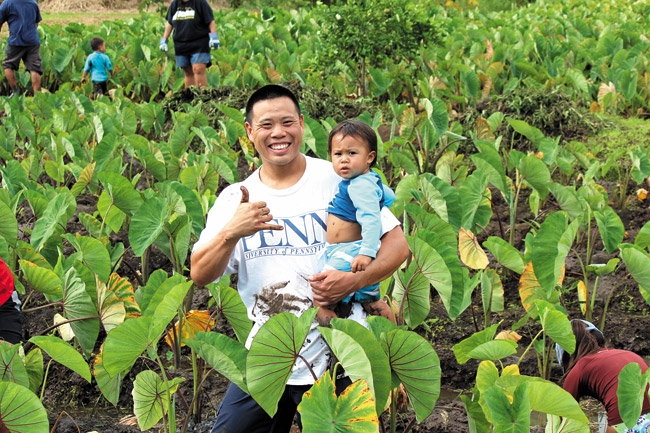Helping The Aina And Young Adults
For young adults who oftentimes find themselves in a hole to the point of no return, a nonprofit group called Kupu is changing lives for the better and helping them appreciate Hawaii’s natural resources. Many bounce back on their feet and land jobs in environmental industries, while others pursue higher education. Kaulana was just 19 and homeless when he participated in one of Kupu’s community programs that taught him about survival skills and sustainability. He believes his life was miraculously transformed.
mw-mufi112013-1
“Kupu helped me get out of a gang and kept me from getting into trouble. It feels like taking a sip of cold water on a hot, clear day … my soul is … refreshed,” says Kaulana.
The green jobs sector is one of the fastest growing industries in the state, increasing at a rate of about 26 percent. Founders John Leong and his wife Julianna started Kupu in 2007 and they are dedicated to giving its members opportunities to grow and sprout, which is what “kupu” means in Hawaiian.
“The kupukupu fern is one of the first plants to bring life back to the land after a lava flow. Our goal is for Kupu and its programs to restore life to the land, ocean, communities, and to the individuals we serve,” says John Leong, who also serves as executive director. I first heard about the mission of Kupu when I met John as a member of the 2006-2007 Pacific Century Fellows class. The more he shared his dreams for Kupu, the more I knew he was onto something special and I am elated at the progress and the difference that he, Julianna and his dedicated staff have made in our community.
Kupu provided nearly $8.8 million in community economic benefits last year, which include the value of volunteer work hours, internship wages/living allowances, educational awards distributed and direct energy savings. That is about a 300 percent impact for each dollar the organization has spent, resulting in improving thousands of acres of important and precious ecosystems.
“This is significant, yet it’s only scratching the surface of the potential that Kupu and its partners can make in Hawaii. Our organization is like an enzyme which helps to catalyze change. We work to bring together a multitude of partners in the nonprofit, government, and corporate sectors to make a difference for a global cause,” says Julianna Leong.
Kupu works with an impressive list of partners, including Kamehameha Schools, AmeriCorps, Castle Foundation, DLNR, and the U.S. Fish and Wildlife Service to name a few.
Environmental, sustainable agriculture (including lo’i and fishponds), and other related industries are benefiting Kupu alumni who are filling these jobs as they open up.
“We see an average of 60 percent or more of our members landing jobs,” says John. The Leongs believe participants are “well prepared to build up sustainable careers in Hawaii and will develop into stronger leaders in the future.”
Kupu has influenced the lives of more than 2,000 alumni, including Christopher Wong, who is pursuing a master’s degree in environmental horticulture at the University of Washington. His mentor was Christian Giardina of the USDA Forest Service in Hilo.
“My internship there steered me toward the field of conservation, and Kupu made me appreciate the uniqueness of the Hawaiian ecosystem. Everyone at the Forest Service had a master’s, and I made it a goal of mine to pursue higher education,” says Wong.
Kupu’s impact is felt in a variety of organizations, nonprofits and federal agencies. Each year, Kupu serves 300 to 400 youths who work with some 12,000 volunteers statewide.
“Hawaii is the endangered species capital of the world, and we provide a tremendous amount of kokua to help our partners excel in preserving our resources. We are developing leaders for the growing sustainability sectors,” says John. “Last year, Kupu’s RISE program had an intern whose work assisted TheBus in reducing diesel consumption by 100,000 gallons per year. We also have an intern helping Howard Hughes Corp. with the LEED certification process for the multi-million Kakaako development.”
The stage is also set in Kakaako, where Kupu will be renovating its existing facility to create a green job and community center in the near future .
Founders John and Julianne are highly optimistic that more success stories will continue to flow from Kupu. After all, their vision is all about the alumni of their cherished environmental program emerging as passionate and knowledgeable leaders in the Pacific, preaching and teaching the importance of wise stewardships of our natural resources for generations to come. For more information on Kupu or if you wish to help the Leongs promote and advance their noble cause, contact them at (808) 735-1221 or email john.leong@kupuhawaii.org.






